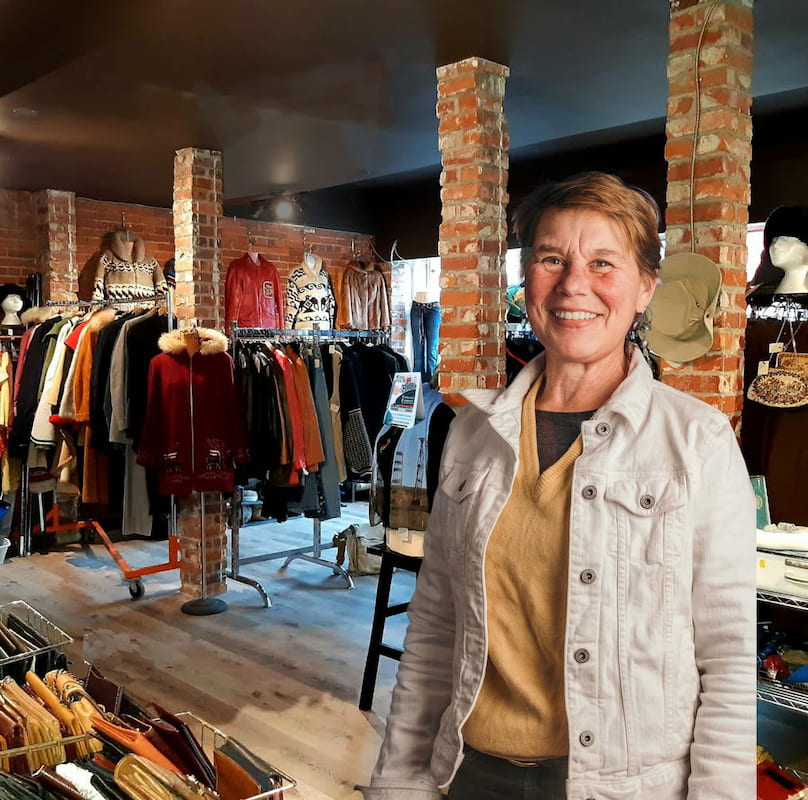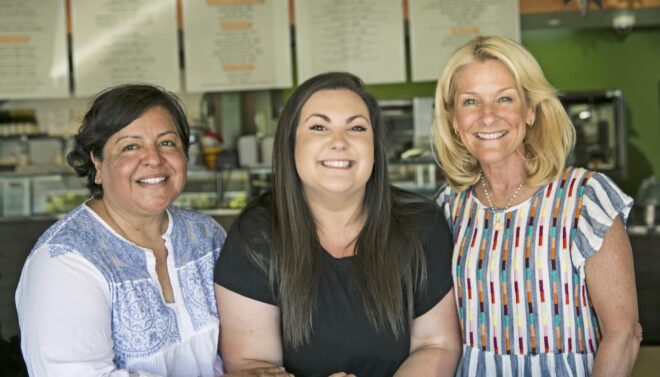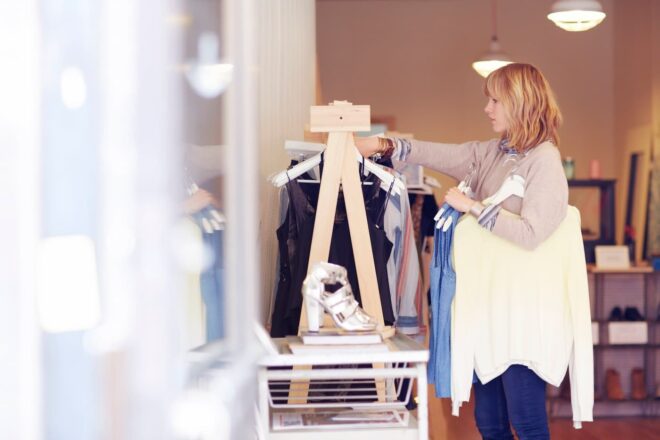KingsPIER vintage
Editorial Team
7 min read
In this installment of Meet the Merchant, we speak to Laura MacNutt of KingsPIER vintage of Halifax, Nova Scotia. As a production designer, Laura channeled her lifelong textile obsession into an entrepreneurial vision of vintage luxury for all. She describes how e-commerce and sustainable fashion can work together to address ethical challenges in the clothing industry.
Our Meet the Merchant series features Q&As with real-world Clover merchants. Read our full catalog for innovative ideas and real-life stories of small businesses in action.
Clover: Hi, Laura! Tell us how you became Halifax, Nova Scotia’s vintage fashionista.
Laura MacNutt: I studied textile and fine art, then practiced architecture for over a decade before transferring those skills to the film industry. As a production designer and art director, I became involved in sourcing wardrobe items for period television series. Coupled with my textile obsession, I started to moonlight in collecting precious pieces. It has much to do with an appreciation of artisanal clothing and slow fashion versus fast.
Clover: Please explain those buzzwords, “slow” versus “fast” fashion. How do you distinguish between them?
MacNutt: It’s up for debate how one might define fast fashion these days. From my perspective, slow fashion is fashion that respects the fabric, the fibers, and whether they’re natural or site-specific synthetics. Appreciating how a garment is designed and created, with the intent of functional endurance; there’s no planned obsolescence.
Distressing a garment intentionally is the antithesis of slow fashion. For instance, mechanically distressing denim belies actual “experience” that causes fading, fraying, and patina. It’s a faux product and ironically requires additional manufacturing energy. Denim should reflect the individual body and the wearer’s experiences , resulting in a customized “breaking in” and perfect fit.
Clover: And it probably ends up in a landfill sooner rather than later.
MacNutt: Exactly! Before the trend of sustainable e-commerce, this was my mission without consciously anticipating the slow fashion movement. I intended to respond to sustainability, emphasizing craftsmanship and the human element of apparel and haute couture. In terms of fast fashion, I was offended by the garment industry’s tragic human rights issues and the poor quality of the clothing. One is a consequence of the other. Clothes became disposable and superficial versus a garment that had utility and purpose.
Clover: How did you turn your vision into a business?
MacNutt: I always believed that this would be my retirement plan, that I could hone my entrepreneurial skills and be my own boss. It continues to be a long game, as this is not a fast-buck, high-profit margin exercise. I started off in a barn, then popped around and did some different incarnations in various brick and mortar locations. For almost two years now, it’s been the current shop in downtown Halifax.
Clover: How did you choose your brick-and-mortar location?
MacNutt: Theoretically, the store serves the tourism industry and college students. We have five universities in the area. It’s across from our theater in a cultural center. Argyle Street is our downtown core. This appeared to be a great location when I moved. But, obviously our businesses suffered immensely through COVID.
Clover: Are young people your primary clientele?
MacNutt: Yeah, fortunately, younger people are becoming more informed about sustainable slow fashion. And there is a lot of conscientious consumption, which is great. But it’s also a pretty varied spectrum. I’m working hard at gaining more market presence in the 30-to-50-year-old range because there’s some nostalgia about the goods.
Part of my model ultimately will be to upcycle some clothing, at which point I will engage somebody else to assist and help and partner with. I’ve got so many scraps of leather and fur and fabric, vintage stuff that we want to make into bags. And I’m excited about that. But I’m just not in that position at the moment.
Since COVID, we’ve listed over a thousand pieces on my website. And each piece takes about 45 minutes on average to document, upload and process. When you account for all that time, it’s not a generous estimation. Forty-five minutes is worth how much? Compared to the real estate value of a store, where things are presented another way. This has meant a whole different business model, which is exceptionally challenging. And customers lost the ability to appreciate a garment in its three dimensions — its smell, feel and fit. Those are difficult to convey via a two dimensional image.
Clover: True. It’s irreplaceable, that experience of live shopping.
MacNutt: It really is. Having customers dance in front of you in their special garments is like magic. Seeing these young kids loving clothing that was made before they were born is so much fun.
Clover: Let’s talk about how your business uses Clover.
MacNutt: We absolutely love our Clover and the Virtual Terminal. I was with a Canadian company that was a disastrous point-of-sale system. And we are thrilled and love Clover for brick-and-mortar sales. Again, that’s engaging with customers in reality in three dimensions, which makes the store worthwhile for me. In order to sustain that, I need to have a virtual presence as well. But I wouldn’t want to be a strictly online business. That just doesn’t do anything for me.
I’ve got a wonderful assistant manager who’s digging into the Clover Customer Engagement suite too. Because our brick and mortar was shut down for an extended period, we really kind of let that slide. She’s doing the learning curve for me. I’m looking forward to capitalizing on those rewards programs and sending customers promos. It’s going to be critical in the coming months.
Clover: It sounds like your brick and mortar is open again now. Are you operating primarily by appointment right now?
MacNutt: Actually, we’re open regularly every day except Mondays — no appointments necessary. We’re at 75 percent capacity. So we’ve been really, really lucky in Nova Scotia and can conduct business now the old-fashioned way. Clientele are still nervous, we don’t have the crowds we used to. We’re just building that up again slowly.
Clover: When you were focusing on online sales exclusively, how did you help customers size themselves and figure out what’s going to fit them and what isn’t, if you can’t be there in-person? What were your workarounds when you weren’t able to operate your business as usual?
MacNutt: Ruthless documentation of the garments, like measuring every aspect of each piece and describing the quality of the material, etc., so that they had a sense. Thus far, we’ve had five-star reviews and no returns of anything that we shipped out, whether local delivery or abroad. So I guess we’re doing that right. But again, it’s compromised significantly.
Clover: Have you noticed a change in your international customer numbers during the pandemic?
MacNutt: It’s increased fourfold. Again, it was a pretty modest part of my business to begin with. I have increased ecommerce sales through Etsy. It’s not sustainable in my opinion, in terms of needing the business to make more traction. In Nova Scotia, I’m the foremost menswear vintage supplier and the only footwear supplier. So I know that I have an advantage in terms of that marketplace. It’s just a matter of finding the right bullhorn to get us in front of those consumers.
Clover: What are some short- and long-term goals on your horizon, once you move beyond the pandemic fully?
MacNutt: Definitely the upcycling stream. That will be a distinct submarket of our business — creating lines of bags and other upcycled products. And collaborating with other vintage businesses in Nova Scotia for vintage tours. We’re creating something like a vintage passport that provides incentives to have a real vintage experience in the province. It will identify vendors and describe the significance of vintage products. It’ll be a real kind of immersive experience.
Clover: Finally, what’s your post-pandemic advice for other small business owners?
MacNutt: Adaptability! The word “pivot” is such a cliche these days, but try to embrace adapting to an evolving market. Don’t restrict yourself to conventional business plans. Rather than feeling defeated by change, I like to celebrate and experience the adventure of it.
Read more of our Meet the Merchant stories for real-life stories of small businesses in action all over the country. Want to be featured in this series? Fill out our questionnaire, and if we can include you in a future interview cycle, we’ll send you an invitation!
Related Posts
LuLu’s Mexican Food
6 useful apps for boutique owners and small retail businesses
Popular Topics
Stay In Touch
Sign up and learn more about Clover.
Thank you for your subscription!
Recent Stories
- Jewelry store supplies and equipment needed for opening day
- How small businesses can use employee discounts to retain staff
- Tips and tricks for opening an outdoor pop-up restaurant
Please share your contact information
to access our premium content.
Thank you for sharing your contact information.
Download Now





